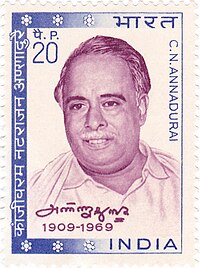| Annadurai Ministry | |
|---|---|
 1st Ministry of Tamil Nadu | |
| Head of the government | |
 Dr. C. N. Annadurai Dr. C. N. AnnaduraiFormer Chief Minister of Tamil Nadu | |
| Date formed | 6 March 1967 |
| Date dissolved | 3 February 1969 |
| People and organisations | |
| Governor | Ujjal Singh |
| Chief Minister | C. N. Annadurai |
| Chief Minister's history | Teacher |
| Total no. of members | 9 |
| Member party | Dravida Munnetra Kazhagam |
| Status in legislature | Majority173 / 234 (74%) |
| Opposition party | Indian National Congress |
| Opposition leader | P. G. Karuthiruman |
| History | |
| Election | 1967 |
| Outgoing election | 1962 |
| Legislature terms | 1 year, 334 days |
| Predecessor | Bhakthavatsalam ministry |
| Successor | First Nedunchezhiyan ministry |
The Ministry of Annadurai was the Council of Ministers, headed by C. N. Annadurai, that was formed after the fourth legislative assembly election, which was held in three phases on 15th, 18th and 21st February 1967. The results of the election were announced in February 1967, and this led to the formation of the 4th Assembly. On 6 March 1967, the Council took office.
Constitutional requirement
For the Council of Ministers to aid and advise Governor
According to Article 163 of the Indian Constitution,
# There shall be a Council of Ministers with the Chief Minister at the head to aid and advise the Governor in the exercise of his function, except in so far as he is by or under this Constitution required to exercise his functions or any of them in his discretion.
- If any question arises whether any matter is or is not a matter as respects which the Governor is by or under this Constitution required to act in his discretion, the decision of the Governor in his discretion shall be final, and the validity of anything done by the Governor shall not be called in question on the ground that he ought or ought not to have acted in his discretion.
- The question whether any, and if so what, advice was tendered by Ministers to the Governor shall not be inquired into in any court.
This means that the Ministers serve under the pleasure of the Governor and he/she may remove them, on the advice of the Chief Minister, whenever they want.
The Chief Minister shall be appointed by the Governor and the other Ministers shall be appointed by the Governor on the advice of the Chief Minister, and the Minister shall hold office during the pleasure of the Governor:
Provided that in the States of Bihar, Madhya Pradesh and Orissa, there shall be a Minister in charge of tribal welfare who may in addition be in charge of the welfare of the Scheduled Castes and backward classes or any other work.
# The Council of Minister shall be collectively responsible to the Legislative Assembly of the State.
- Before a Minister enters upon his office, the Governor shall administer to him the oaths of office and of secrecy according to the forms set out for the purpose in the Third Schedule.
- A Minister who for any period of six consecutive months is not a member of the Legislature of the State shall at the expiration of that period cease to be a Minister.
- The salaries and allowances of Ministers shall be such as the Legislature of the State may from time to time by law determine and, until the Legislature of the State so determines, shall be a specified in the Second Schedule.
Council of Ministers
| Chief Minister | ||||||
|---|---|---|---|---|---|---|
| No. | Name | Constituency | Portfolio | Departments | Political party | |
| 1 | C. N. Annadurai | Leader of the Legislative Council | Chief Minister |
|
Dravida Munnetra Kazhagam | |
| Cabinet Ministers | ||||||
| 2 | V. R. Nedunchezhiyan | Triplicane | Minister for Education and Industries |
|
Dravida Munnetra Kazhagam | |
| 3 | M. Karunanidhi | Saidapet | Minister for Public Works |
| ||
| 4 | K. A. Mathiazhagan | Thousand Lights | Minister for Food and Revenue |
| ||
| 5 | A. Govindasamy | Mugaiyur | Minister for Agriculture |
| ||
| 6 | Sathiavani Muthu | Perambur | Minister for Harijan Welfare and Information |
| ||
| 7 | S. Madhavan | Tiruppattur | Minister for Law and Co-operation |
| ||
| 8 | S. J. Sadiq Pasha | Udumalaipettai | Minister for Public Health |
| ||
| 9 | M. Muthuswamy | Namakkal | Minister for Local Administration |
| ||
References
- TAMIL NADU LEGISLATIVE ASSEMBLY QUADRENNIAL REVIEW 1967-70 (PDF), Chennai: Government of Tamil Nadu, 1971
- OVERVIEW, FOURTH ASSEMBLY. "FOURTH ASSEMBLY OVERVIEW". assembly.tn.gov.in. Archived from the original on 17 August 2016. Retrieved 25 May 2021.
- a timeline, C. N. Annadurai (15 September 2009). "C. N. Annadurai: a timeline". The Hindu. Retrieved 25 May 2021.
- The southern separatist-turned-nationalist, CN Annadurai (15 September 2018). "CN Annadurai: The southern separatist-turned-nationalist". ThePrint. Retrieved 25 May 2021.